Introduction
In the dynamic world of digital marketing, AI has emerged as a transformative force, offering unprecedented opportunities for businesses to optimize their strategies across all channels. From SEO and SEM to automation and analytics, AI-powered tools are revolutionizing the way marketers engage with their audiences. This blog post will delve into the strategic use of AI in digital marketing, exploring its advantages, disadvantages, future trends, and real-world case studies. By the end, you’ll have a comprehensive understanding of how AI can unlock growth for your business.
How to Use AI in Digital Marketing Strategy and Optimize All Channels: SEO, SEM, Automation, and Analytics?
Artificial Intelligence (AI) has revolutionized the way businesses approach digital marketing. From enhancing customer experiences to optimizing campaigns across multiple channels, AI offers unprecedented opportunities for marketers to refine their strategies and achieve better results. In this comprehensive guide, we will explore how AI can be leveraged in digital marketing, focusing on key areas such as SEO, SEM, automation, and analytics. We’ll also discuss trends, advantages, disadvantages, case studies, and future possibilities.
The digital marketing landscape has undergone a seismic shift over the past decade, driven largely by technological advancements. Among these innovations, Artificial Intelligence (AI) stands as one of the most transformative forces reshaping how businesses interact with their audiences. AI refers to the development of computer systems capable of performing tasks that typically require human intelligence—such as learning, reasoning, problem-solving, perception, and language understanding.
For marketers, AI represents both a challenge and an opportunity. On one hand, it demands a willingness to adapt and learn new tools. On the other hand, it offers unprecedented capabilities for enhancing customer experiences, optimizing campaigns, and driving measurable results. From automating repetitive tasks to delivering hyper-personalized content, AI empowers marketers to achieve more with less effort.
Why Should Marketers Care About AI?
Here are some compelling reasons why AI matters in digital marketing:
- Data-Driven Insights : AI processes vast amounts of data quickly, uncovering patterns and trends that humans might miss.
- Automation : It automates time-consuming tasks, freeing up marketers to focus on strategy and creativity.
- Personalization : AI enables tailored messaging and experiences that resonate with individual users.
- Scalability : With AI, businesses can scale their efforts without sacrificing quality or consistency.
In today’s fast-paced world, where consumer expectations are higher than ever, leveraging AI is no longer optional—it’s essential. By integrating AI into your digital marketing strategy, you can stay ahead of the competition and deliver superior value to your audience.
The Rise of AI in Digital Marketing
AI is no longer a futuristic concept; it’s a reality that’s reshaping the digital marketing landscape. According to Statista, global AI spending in marketing is projected to exceed $107 billion by 2028. This surge in investment is driven by AI’s ability to enhance customer experiences, automate processes, and optimize ad targeting. Here are some key areas where AI is making a significant impact:
SEO: Optimizing for the Future
SEO has always been about understanding and optimizing for search engines. With AI, this process is becoming more sophisticated. AI-driven tools can analyze vast amounts of data to identify patterns and trends, providing actionable insights for SEO strategies. Here are some ways AI is transforming SEO:
- Natural-Language Queries: AI algorithms are becoming increasingly adept at understanding natural language, making it crucial for businesses to optimize their content for conversational queries.
- Content Optimization: Tools like Surfer SEO use AI to analyse top-ranking content and provide recommendations for improving your own content.
- Voice Search: With over 50% of searches conducted via voice assistants, optimizing for voice search is becoming a priority.

SEM: Hyper-Personalization and Automation
SEM involves paid advertising on search engines, and AI is taking this to new heights. AI-driven tools can analyse user behaviour and optimize ad placements in real-time, ensuring that ads reach the most relevant audience. Here are some key trends:
- Automated Bidding: AI algorithms can analyse historical data and real-time user behaviour to set optimal bids, maximizing ROI.
- Ad Creative Optimization: Tools like Jasper AI can generate high-quality, SEO-optimized ad copy, ensuring that ads are not only relevant but also engaging.
- Predictive Analytics: AI can forecast consumer behaviour, allowing marketers to make data-driven decisions and adjust campaigns proactively.

Automation: Streamlining Marketing Efforts
AI-driven automation is streamlining marketing processes, reducing the need for manual intervention and increasing efficiency. Here are some ways AI is enhancing marketing automation:
- Chatbots: AI-powered chatbots offer 24/7 customer support, reducing response times and enhancing user experiences.
- Email Marketing: Tools like Mailchimp AI and HubSpot use AI to optimize email campaigns with automated segmentation and personalized content.
- Social Media: AI tools can automate social media posting, ensuring consistent engagement across platforms.
Analytics: Data-Driven Decision Making
AI is revolutionizing analytics by providing deeper insights into customer behaviour and campaign performance. Here are some key applications:
- Real-Time Analytics: AI tools can analyse data in real-time, providing instant insights that can be used to adjust campaigns on the fly.
- Customer Segmentation: AI algorithms can analyse user behaviour to create highly targeted marketing campaigns, improving engagement and conversion rates.
- Sentiment Analysis: Brands can use AI to analyse customer sentiment and adjust marketing strategies accordingly.
Key Components of AI in Marketing
- Machine Learning (ML) : ML algorithms allow machines to learn from data and improve performance over time without explicit programming. For example, Google’s RankBrain uses machine learning to interpret search queries and provide better results.
- Natural Language Processing (NLP) : NLP enables computers to understand, interpret, and generate human language. Tools like Grammarly and GPT-3 use NLP to assist with content creation and editing.
- Computer Vision : This technology allows machines to interpret visual information such as images and videos. Social media platforms like Instagram and Pinterest use computer vision to analyze user-generated content and recommend relevant posts.
- Predictive Analytics : Predictive analytics leverages historical data to forecast future outcomes. Marketers use this capability to predict customer behavior, optimize budgets, and enhance campaign performance.
How Does AI Work in Practice?
Imagine running a large-scale email marketing campaign. Without AI, you’d need to manually segment your audience, craft personalized messages, and monitor performance metrics. With AI, however, you can automate all these steps:
- Segmenting audiences based on behavioural data.
- Generating dynamic subject lines and content tailored to each recipient.
- Analysing open rates, click-through rates, and conversions in real-time.
This level of efficiency and precision is what makes AI so valuable in digital marketing.
Example: Netflix’s Recommendation System
Netflix uses AI to analyse viewing habits and suggest shows that align with user preferences. As a result, 80% of the content watched on Netflix comes from recommendations rather than manual searches.
How AI Can Be Used in SEO?
Search Engine Optimization (SEO) remains a cornerstone of digital marketing, helping businesses rank higher in search engine results pages (SERPs). AI enhances SEO efforts by streamlining processes, improving accuracy, and providing actionable insights.
Ways AI Enhances SEO
- Keyword Research : AI-powered tools like Ahrefs, SEMrush, and Ubersuggest analyze billions of keywords to identify high-value opportunities. These tools also track keyword trends, helping marketers stay ahead of competitors.
- Content Creation : Platforms like Jasper AI and Copy.ai use natural language generation (NLG) to produce high-quality, SEO-friendly content. They can write blog posts, product descriptions, social media updates, and even long-form articles.
- Technical Audits : AI tools like Sitebulb and Screaming Frog crawl websites to detect technical issues such as broken links, duplicate content, and slow page load times. Fixing these issues improves site health and boosts rankings.
- Rank Tracking : Tools like Moz and Rank Ranger monitor keyword rankings across multiple search engines and devices. They provide detailed reports and suggestions for improvement.
- On-Page Optimization : AI analyses webpage elements like title tags, meta descriptions, headers, and images to ensure they align with best practices. For instance, Yoast SEO uses AI to evaluate content quality and readability.
Case Study: Neil Patel’s AI-Powered Blog
Neil Patel, a renowned digital marketing expert, uses AI to optimize his blog for search engines. By leveraging tools like Surfer SEO and Clearscope, he ensures every article meets Google’s E-A-T (Expertise, Authority, Trustworthiness) guidelines. As a result, his blog consistently ranks at the top of SERPs for competitive keywords.

Leveraging AI for SEM Optimization
Search Engine Marketing (SEM), commonly known as pay-per-click (PPC) advertising, involves promoting products or services through paid ads on search engines. AI plays a critical role in optimizing SEM campaigns by automating bid management, targeting, and ad creation.
Benefits of AI in SEM
- Automated Bidding : Google Ads’ Smart Bidding uses machine learning to adjust bids dynamically based on factors like device type, location, and time of day. This ensures maximum ROI while minimizing costs.
- Dynamic Ad Creation : AI generates personalized ads based on user behaviour and demographics. For example, Facebook Ads uses AI to create variations of ad copy, images, and calls-to-action to test which combinations perform best.
- Audience Targeting : Predictive analytics helps identify high-conversion audiences by analysing past interactions, purchase history, and demographic data. This ensures ads reach the right people at the right time.
- Performance Monitoring : Real-time dashboards powered by AI provide instant feedback on campaign performance. Marketers can make data-driven adjustments to improve results.
Example: Microsoft Ads’ AI Features
Microsoft Ads offers several AI-driven features, including:
- Audience Insights : Provides detailed profiles of target audiences, including interests, behaviours, and purchasing habits.
- Smart Campaigns : Automates ad creation, bidding, and targeting for small businesses with limited resources.
- Conversion Tracking : Measures the effectiveness of ads by tracking key metrics like clicks, leads, and sales.
By leveraging these tools, businesses can achieve better results with less effort.
AI-Powered Marketing Automation
Marketing automation simplifies repetitive tasks, enabling marketers to focus on strategy and innovation. When combined with AI, automation becomes even more powerful, offering advanced capabilities for personalization, segmentation, and engagement.
Applications of AI in Marketing Automation
- Email Campaigns : AI analyses subscriber behaviour to send targeted emails at optimal times. For example, HubSpot’s Email Marketing tool uses AI to recommend subject lines, preview text, and send times based on historical data.
- Chatbots : Virtual assistants handle customer queries 24/7, improving response times and reducing workload. Chatbots can also qualify leads, schedule appointments, and provide product recommendations.
- Lead Scoring : AI evaluates leads based on behaviour and demographics to prioritize sales efforts. Leads with higher scores receive immediate attention, while lower-scoring leads are nurtured through automated workflows.
- Social Media Management : Tools like Hootsuite and Buffer use AI to schedule posts during peak engagement periods. They also analyse performance metrics to suggest improvements.
- Customer Journey Mapping : AI tracks user interactions across multiple touchpoints, creating a comprehensive view of the customer journey. This helps marketers identify pain points and optimize the experience.
Fact: AI in Email Marketing
According to McKinsey, businesses using AI for email marketing see a 76% improvement in open rates and a 50% increase in click-through rates.
Enhancing Analytics with AI
Data analytics is crucial for measuring the success of digital marketing campaigns. AI takes analytics to the next level by providing deeper insights, predictive modeling, and actionable recommendations.
How AI Improves Analytics
- Data Visualization : Tools like Tableau and Power BI use AI to create interactive dashboards that simplify complex data sets. Users can explore trends, drill down into details, and share findings with stakeholders.
- Sentiment Analysis : Natural language processing (NLP) algorithms gauge public opinion about brands on social media. For example, Brandwatch uses AI to analyze millions of conversations and identify emerging trends.
- Customer Segmentation : AI clusters users into segments based on shared characteristics such as age, gender, location, and buying behavior. This enables marketers to tailor campaigns to specific groups.
- Conversion Attribution : AI models determine which touchpoints contribute most to conversions, helping marketers allocate budgets effectively. For instance, Adobe Analytics uses AI to attribute credit to various channels in multi-touch attribution models.
Trend: Predictive Modeling
Predictive modeling uses historical data to forecast future outcomes. In digital marketing, this capability helps answer questions like:
- Which customers are likely to churn?
- What products will sell best next quarter?
- Where should we allocate our budget for maximum impact?
By incorporating predictive modelling into their strategies, marketers can make informed decisions and stay ahead of the curve.

Trends and Innovations in AI for Digital Marketing
The field of AI in digital marketing is constantly evolving, with new trends and innovations emerging regularly. Here are some of the latest developments:
- Voice Search Optimization : With the rise of smart speakers like Amazon Alexa and Google Home, optimizing for voice search has become increasingly important. Voice search queries tend to be conversational and question-based, requiring a different approach to keyword targeting.
- Augmented Reality (AR) : Brands are using AR to create immersive experiences that engage customers and drive sales. For example, IKEA’s AR app lets users visualize furniture in their homes before making a purchase.
- Conversational AI : Chatbots and virtual assistants are becoming more sophisticated, thanks to advancements in natural language understanding (NLU) and sentiment analysis. Conversational AI enables seamless interactions between businesses and customers.
- Cross-Channel Integration : AI unifies data from multiple channels—such as email, social media, and paid ads—to provide a holistic view of customer behaviour. This enables marketers to deliver consistent messages across platforms.
- Generative AI : Generative AI tools like DALL-E and MidJourney can create original images, videos, and text based on user input. Marketers are experimenting with these tools to produce engaging content at scale.
- Hyper-Personalization: AI is enabling deeper personalization than ever before, moving beyond basic demographics to individual preferences, behaviours, and real-time context. This includes personalized content recommendations, product suggestions, and even dynamic website experiences tailored to each user.
- Predictive Analytics: AI algorithms can analyse vast datasets to predict future customer behaviour, allowing marketers to proactively target potential customers, optimize campaign spending, and personalize customer journeys.
- AI-Powered Content Creation: Tools are emerging that can assist with content creation, from generating marketing copy and blog posts to creating visuals and even videos. This allows marketers to scale content production while maintaining quality and relevance.
- Automated Campaign Optimization: AI can automate many aspects of campaign management, including bidding strategies, ad placement, and audience targeting. This frees up marketers to focus on strategy and creative development.
- Conversational AI and Chatbots: Chatbots powered by natural language processing (NLP) are becoming increasingly sophisticated, providing personalized customer service, lead generation, and even sales support.
- Visual Search: AI is enabling visual search, allowing users to search for products and information using images. This has significant implications for e-commerce and product discovery.
- Voice Search Optimization: As voice search becomes more popular, AI is playing a crucial role in optimizing content and websites for voice queries, which tend to be more conversational and long-tail.
- AI-Driven Social Media Marketing: AI can analyze social media data to identify trends, understand audience sentiment, and automate social media posting and engagement.
- Ethical AI and Data Privacy: As AI becomes more prevalent in marketing, there is a growing focus on ethical considerations, including data privacy, algorithmic bias, and transparency.
- Cross-Channel Attribution: AI can help marketers understand the complex customer journey across multiple channels, providing more accurate attribution and enabling data-driven budget allocation.
- Real-Time Marketing: AI enables real-time marketing by analyzing data and triggering personalized responses and offers in the moment, enhancing customer engagement and conversions.
- No-Code AI Platforms: The rise of no-code AI platforms is making AI accessible to marketers without coding skills, democratizing access to this powerful technology.
What’s New in 2025?
Recent advancements include:
- Enhanced natural language understanding in chatbots.
- Improved predictive modelling for customer lifetime value (CLV).
- Increased adoption of generative AI for creative content.
- Recent advancements are pushing the boundaries of AI in digital marketing, creating more sophisticated and effective tools for marketers:
- Enhanced Natural Language Understanding (NLU) in Chatbots: Chatbots are becoming significantly more conversational and human-like. Improved NLU allows them to understand complex queries, nuanced language, and even sentiment, leading to more accurate responses and more engaging customer interactions. This means less reliance on pre-programmed scripts and a more seamless experience for users seeking assistance or information. Think chatbots that can truly understand the intent behind a question, even if it’s phrased indirectly, and respond with relevant, personalized solutions.
- Improved Predictive Modeling for Customer Lifetime Value (CLV): AI algorithms are now capable of much more accurate and granular CLV predictions. By analyzing a wider range of data points, including browsing history, purchase patterns, social media interactions, and even customer service interactions, marketers can identify high-value customers and personalize strategies to nurture those relationships. This allows for more targeted marketing efforts and optimized resource allocation, maximizing long-term profitability. Imagine being able to predict not just if a customer will make another purchase, but when and what they are most likely to buy, allowing for perfectly timed and relevant promotions.
- Increased Adoption of Generative AI for Creative Content: Generative AI is rapidly transforming content creation. Beyond simple text generation, these tools can now create high-quality images, videos, music, and even code. This opens up exciting new possibilities for marketers, allowing them to produce compelling and unique content at scale, personalize creative assets for different audiences, and even automate the creation of entire marketing campaigns. Consider the potential for automatically generating different versions of an ad creative, each tailored to a specific segment of your audience, or even creating unique product visualizations and demos.
8. Advantages of Using AI in Digital Marketing
Integrating AI into your digital marketing strategy offers numerous benefits:
- Increased Efficiency : AI automates routine tasks, saving time and resources. For example, AI-powered scheduling tools eliminate the need for manual calendar management.
- Improved Accuracy : AI reduces errors in data analysis and campaign execution. Machine learning algorithms continuously refine their predictions, ensuring better outcomes over time.
- Better Personalization : AI delivers tailored experiences to individual users, increasing engagement and conversion rates. Personalization extends beyond email marketing to include website content, product recommendations, and ad targeting.
- Higher ROI : Optimizing campaigns with AI ensures maximum returns on investment. Automated bidding, dynamic ad creation, and predictive analytics all contribute to better performance.
- Competitive Edge : Early adopters of AI gain a significant advantage over competitors who rely solely on traditional methods. Staying ahead of the curve positions businesses for long-term success.
9. Disadvantages and Challenges
While AI offers many advantages, it also presents challenges that must be addressed:
- High Costs : Implementing AI solutions can be expensive, especially for small businesses with limited budgets. Licensing fees, hardware requirements, and training costs add up quickly.
- Complexity : Setting up and maintaining AI systems requires specialized knowledge. Many organizations struggle to find qualified personnel or invest in adequate training programs.
- Data Privacy Concerns : Handling sensitive user data raises ethical questions about privacy and security. Businesses must ensure compliance with regulations like GDPR and CCPA.
- Over-reliance : Over-dependence on AI may lead to neglecting human intuition and creativity. While AI excels at crunching numbers, it lacks emotional intelligence and contextual understanding.
Balancing Human and Machine
To overcome these challenges, marketers must strike a balance between AI capabilities and human oversight. Combining the strengths of both approaches yields the best results.
References
1. HubSpot Research
- The State of Marketing 2023 – HubSpot’s annual report provides key trends, statistics, and insights into how marketers are leveraging AI for email marketing, content creation, and lead generation.
- AI in Marketing: The Ultimate Guide – A comprehensive guide covering the basics of AI in marketing, its applications, and real-world examples.
2. Gartner Insights
- Predicts 2023: Artificial Intelligence – Gartner’s predictions for AI adoption in marketing highlight trends like hyper-personalization, conversational AI, and ethical considerations.
- How AI Will Transform Marketing by 2025 – An article discussing the future impact of AI on marketing strategies and customer experiences.
3. McKinsey & Company Reports
- Artificial Intelligence: The Next Digital Frontier? – This report explores the transformative potential of AI across industries, including digital marketing.
- AI in Marketing and Sales – A detailed analysis of how AI is reshaping marketing and sales functions, with case studies and practical recommendations.
4. Harvard Business Review Articles
- The Promise of Artificial Intelligence in Marketing – This article examines the benefits and challenges of integrating AI into marketing strategies, emphasizing personalization and efficiency.
- Why Companies Are Struggling to Scale AI – While not exclusively focused on marketing, this piece highlights common obstacles businesses face when implementing AI at scale.
5. Additional Resources
- Google Ads Help Center – Smart Bidding – Official documentation explaining Google Ads’ AI-driven bidding strategies.
- Microsoft Ads Blog – AI Features – Insights into Microsoft Ads’ AI capabilities, including audience insights and smart campaigns.
- Adobe Analytics Blog – Predictive Modeling – Explains how predictive modeling enhances attribution and campaign optimization.
